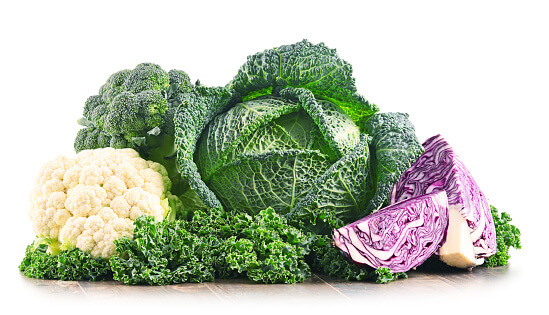Prime Veggies For Women in Their Prime!
8 years ago | Nutrition
By Joy Stephenson-Laws, JD, Founder
I’ve already come clean about the fact that I really do not like the taste of broccoli. But I have started to try various ways to make it more tasty due to the myriad of health benefits this veggie may provide. And I recently learned that cruciferous vegetables, ones (including broccoli) that come from the plant family Cruciferae, may help with stroke and heart attack prevention.
Along with broccoli, types of cruciferous veggies include Brussels sprouts, cabbage, cauliflower, kale, radish, turnip, arugula, watercress, bok choy, collard greens and rutabaga.
Researchers recently found that cruciferous vegetables may reduce plaque buildup in the carotid arteries of older women. Your carotid arteries are two large blood vessels in your neck that supply your brain and head with blood. You have an external carotid artery which provides blood for outside structures such as the face, scalp and neck. And then you have an internal carotid artery, responsible for the blood supply to the brain.
Carotid artery disease is a serious issue, because it can block the flow of blood to your brain and cause a stroke. And if you have buildup in your neck arteries, your are also more likely to have buildup in the coronary (heart) arteries.
An Australian research team examined nearly 1,000 women ages 70 and older and gave them a food frequency questionnaire that asked about their vegetable intake. The researchers noted intake of cruciferous vegetables as well as intake of vegetables in general. Through examination by sonograms, the researchers were able to measure the carotid artery wall thickness in the women.
They “found that independent of lifestyle and cardiovascular risk factors, women who ate more vegetables – cruciferous vegetables in particular – had healthier carotid arteries,” according to a report on the study from the American Heart Association (AHA).
It is important to note that this study focused on women. Heart disease is often thought of as an issue that affects men more than women, but the AHA reports that cardiovascular diseases and stroke cause 1 in 3 women’s deaths each year, killing approximately one woman every 80 seconds.
“Researchers aren’t entirely sure what gives these cruciferous vegetables more of a protective effect than other vegetables, but they hypothesize it is because cruciferous vegetables are packed with nutrients and phytochemicals but are low in energy [having few calories].”
More research is still needed and this study does not mean that you should single out and only eat cruciferous veggies. Eating a variety of veggies is still important to maintain nutritional balance.
Other possible benefits of cruciferous veggies?
“High intakes of cruciferous vegetables have been associated with lower risk of bladder, breast, colorectal, endometrial, gastric, lung, ovarian, pancreatic, prostate, and renal cancer,” reports the Linus Pauling Institute.
And according to the American Nutrition Association, a phytochemical called sulforaphane is produced when you chew cruciferous vegetables. Sulforaphane may have anticancer and antimicrobial properties. It is particularly rich in broccoli sprouts, which I discovered are actually great tasting sprinkled over a salad or omelet.
On top of this, a study from the National Institutes of Health (NIH) found evidence that sulforaphane may reduce inflammation in the body that may contribute to depression.
Ways to include more cruciferous veggies in your diet?
One easy way to include more of these types of veggies in your diet is by tossing some fresh kale into your fruit smoothies. You can even buy fresh, bagged cauliflower, freeze it and then add it to a fruit smoothie. You won’t even taste the cauliflower.
A simple kale salad is also a nice way to change up your salad greens. Kale is also great in soups and sauces. It is a tougher green, so it holds up well.
And if you like broccoli, keep eating it!
Any risks associated with cruciferous veggies?
Like with all foods, you should eat cruciferous vegetables in moderation. Some reports say that a high intake of cruciferous vegetables may cause hypothyroidism. Cooking cruciferous veggies may decrease the likelihood of developing any thyroid issues. Don’t let this prevent you from including these potentially life-saving veggies in your diet. Again, moderation and balance is important with any foods you include in your diet.
If you have any thyroid issues, speak with a competent healthcare professional about how you can tailor your diet to include cruciferous vegetables.
Enjoy your healthy life!
The pH professional health care team includes recognized experts from a variety of health care and related disciplines, including physicians, attorneys, nutritionists, nurses and certified fitness instructors. This team also includes the members of the pH Medical Advisory Board, which constantly monitors all pH programs, products and services. To learn more about the pH Medical Advisory Board, click here.







